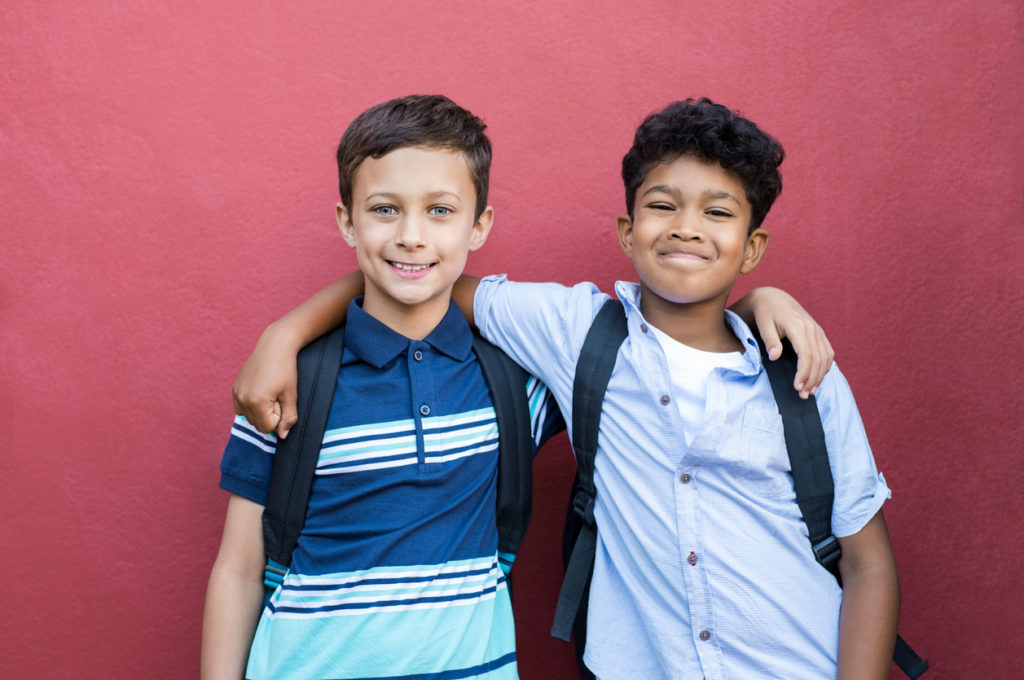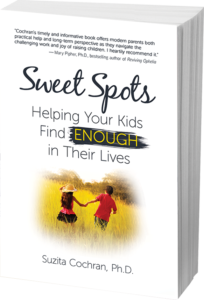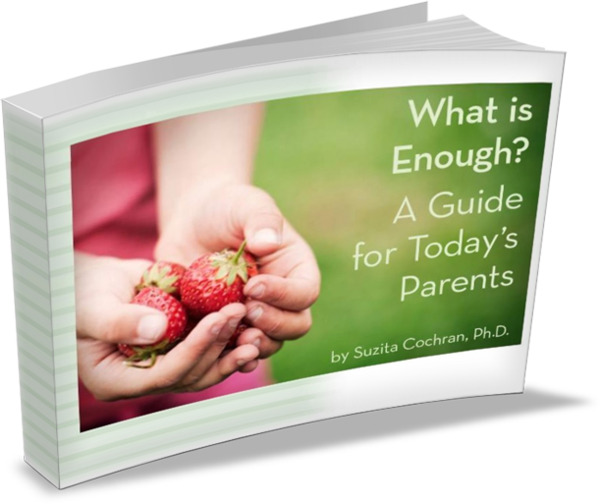When our son Stephen was about to begin kindergarten, he worried about not knowing anyone in his new class. No one from his preschool was attending his school, and he assumed it would be hard to make friends.
We did a number of things to help our rising kindergartner become more comfortable with the school building, but we also talked to him about noticing and being kind to others in his new class. We reminded him that he wouldn’t be the only kid who was nervous on the first days of school.
We came up with compliments Stephen could give other kids as a way to begin connecting, such as, “I like your lunchbox.” Encouraging Stephen to notice how others in class were doing had the unintended effect of taking his focus off his own worries. A lucky parenting win for us!
After his first day of school, Stephen told us about a boy named Jeffrey who sometimes started yelling in the middle of class. When we asked more about this, it seemed that Jeffrey might not be neurotypical, and was having a hard time adjusting to school. Stephen said he didn’t mind the screaming too much.
“I’m kind of used to it since Annie screams a lot too.” Annie was Stephen’s one-year-old sister who was indeed quite a screamer at the time.
Settling Into Kindergarten
Over time Stephen settled into kindergarten, and we didn’t hear as much about Jeffrey. In our first parent/teacher conference, Stephen’s teacher said he was quite a help with Jeffrey who she mentioned had autism.
Stephen’s teacher told us that he was a calm presence when Jeffrey was stressed and beginning to scream. One day Stephen had been at Jeffrey’s table when this happened and spoke a few words to Jeffrey during his outburst. This seemed to help, and since Stephen wasn’t particularly distracted by Jeffrey, from that day on the teacher placed him at Jeffrey’s table. Stephen was fine with this seating arrangement, and rarely mentioned it to us. As parents we appreciated that this situation was helping Stephen practice being compassionate.
As the Years Went On
The years went on and we noticed that Jeffrey was often in Stephen’s grade school class. But there were many other ups and downs to focus on, so we didn’t talk a lot about Jeffrey except to hear that he was doing better each year. When Stephen was in 4th grade, the school counselor casually mentioned that each year they made sure Stephen was in class with Jeffrey since he continued to be a calming influence on him.
I was reminded of Stephen’s relationship with Jeffrey when I recently read Social Justice Parenting: How to Raise Compassionate, Anti-Racist, Justice-Minded Kids in an Unjust World, by Dr. Traci Baxley.
Baxley is a professor, parenting coach, and mother of five. She is also a Black woman married to a white man who writes about this experience in the context of parenting. Stephen and Jeffrey’s interactions struck me as similar to those described in Baxley’s book. Jeffrey is Latino and adopted, as well as neurodivergent.
Teaching Children to Give Back
One of the social justice parenting principles in Baxley’s home is:
“Always give back. …I want my children to know we have a lot, which means that we have the opportunity to give a lot. This rule teaches compassion (thinking of others) and kindness (recognizing our privilege and doing something about it) and makes social justice engagement a part of their lives.”
Social Justice Parenting is inspirational and aspirational. Baxley understands that we want what’s best for our children, but states that in order to make the world a better place, we need to want (and take action toward) what’s best for ALL children. A major theme of the book is teaching kids to be allies.
Teaching Kids to Be Allies
In Baxley’s view allyship is “the act of decentering yourself in order to make space for others who are different from you, those who are at that moment marginalized…It is using your power and unearned privileges to act with and for others in pursuit of ending oppression and racism and creating equity.” She gives many suggestions for teaching children how to be allies.
Don’t Avoid Hard Topics with Children
Baxley encourages parents not to shy away from hard topics with children. We should talk with kids in an age-appropriate way, but we must not put off talking to them about hard things “until they are older.” Kids as young as 3 are aware of different skin colors.
Stephen and I had discussed Jeffrey’s struggles in the classroom, such as the fact that his brain was much more sensitive to loud noises than Stephen’s, and how other students could help with this. This was an easier conversation than some because we lived across the street from a group home where adults with autism lived, so Stephen already knew others with issues similar to Jeffrey’s.
Teaching Children the Concept of Privilege
Baxley writes that anti-racist kids understand the impact of privilege on their lives and the lives of others. But she acknowledges that privilege is “often weaponized in conversations about race in the media, and used to provoke guilt, anger, and defensiveness—which ultimately further divides people.”
The book offers a list of different areas within which people are privileged, as a reminder that we may have privilege in one area but not another. These domains are a good starting point for talking about privilege with children.
- Gender
- Race
- Class
- Nationality
- Ethnicity
- Sexual Orientation or Gender Identity
- Religion
- Physical Ability
- Age
- Language Spoken
- Brain Differences (Neurotypical vs. Neurodivergent)
A Lot for Parents to Take In
It can be overwhelming to think about teaching our children about social justice. But reading Baxley’s book reminded me that we can take one step at a time. As issues arise in our children’s lives, we can connect these to social justice concepts. When an injustice takes place in our community or country, we can talk about it with our children and discuss what they can do to try to make things better. Sometimes it’s writing a letter; other times it’s attending a protest; often it’s as small as role-playing what they could say or do to be an ally in a similar situation.
Small parental comments can have a big effect. We might talk to our children about a friend whose social justice actions we respect, and tell our children we are attempting to be more like that person.
Most of Baxley’s social justice lessons come down to kindness. She offers “The Platinum Rule”—which I love and am going to appropriate—which is a step better than the Golden Rule we all know.
Treat others the way THEY want to be treated.
When I feel overwhelmed about how much social justice parenting I still have ahead of me, I am going to re-ground myself by going back to the Platinum Rule, then taking it all one step at a time.
If you liked this topic, you will find more like it in my book:






I love this post. It is so important to talk about privilege with our kids. Up communication skills and get curious. Yes, the Platinum Rule!